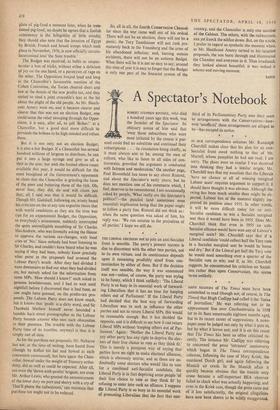THE LIBERAL DECISION not to join an anti-Socialist front is
sensible. The party's present success is due to discontent with the other two parties, not to its own virtues, and its continuance depends upon it remaining prudishly aloof from con- tamination by either of them. But if the decision itself was sensible, the way it was announced was not—unless, of course, the party was trying to be funny, which I think unlikely : 'The Liberal Party is so busy in its essential work of forward- ing Liberalism that it has no time for keeping others out of Parliament.' If the Liberal Party had decided that the best way of forwarding Liberalism was to seek to influence the other parties and not to return Liberal MPs, this would be reasonable enough. But it has decided the opposite, and it is difficult to see how it can return Liberal MPs without.'keeping others out of Par- liament.' Again : 'Neither the Liberal Party nor any other party has any right to deprive the elec- tors of their free choice to vote as they think fit.' This is merely a pompous way of saying that parties have no right to make electoral alliances, which is obviously untrue; and as there are un- doubtedly some electors who would like to vote for a combined anti-Socialist candidate, the Liberal Party is in fact depriving some people 'of their free choice to vote as they think fit' by refusing to enter into such an alliance. I suppose to Liberal Party is so busy in its essential work of promoting Liberalism that the fact that one- third of its Parliamentary Party owe their seats to arrangements with the Conservatives—how- ever 'unofficial' these arrangements are alleged to be—has escaped its notice.




























 Previous page
Previous page